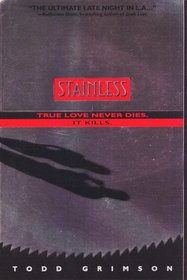Helpful Score: 1
The following short review was written in 1996, a year when it seemed to most reviewers and critics of horror fiction that vampire stories were so played out, so overexposed, so been-there-done-that, that anyone trying to write about vampires might garner a small fan base of goth teens, but for everyone else in the horror community, simply the v-word, said aloud, could provoke a chorus of boo's. More than that--it was an instant emetic--that's how sick of all things vampire we were. The whole mood back then seems odd and distant now. I don't know what changed, but obviously vampires didn't go away. And Stainless is an even better book than it was at the time, because now, odd though it seems, we're not as jaded as we were in 1996. It's OK again to write about slacker-vampire-rock-stars in California, especially when it's Todd Grimson--a superb stylist--doing the writing.
--------------------------------------------------------------
[review first published in 1996]
Are vampires played out as subjects for fiction? The misfortune of this deft, appealing little novel is that this may not be a good time for another tale of rock stars, slackers and vampires in a wealthy-but-seedy California setting. If you can get past that problem, though, you'll find much to admire in Stainless: spare, lyrical prose; a refusal to glamorize empty lifestyles; a vampire-human love relationship that reaches for, but never achieves, real connection. Douglas Winter, in The Washington Post, calls this "an intriguing alternative to the usual suspects of the vampire set."
--------------------------------------------------------------
[review first published in 1996]
Are vampires played out as subjects for fiction? The misfortune of this deft, appealing little novel is that this may not be a good time for another tale of rock stars, slackers and vampires in a wealthy-but-seedy California setting. If you can get past that problem, though, you'll find much to admire in Stainless: spare, lyrical prose; a refusal to glamorize empty lifestyles; a vampire-human love relationship that reaches for, but never achieves, real connection. Douglas Winter, in The Washington Post, calls this "an intriguing alternative to the usual suspects of the vampire set."
A very different writing style, sort of detatched but intriguing.




